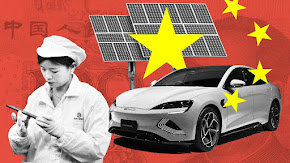Why Europe is losing the electric car race to China: The hidden impact of subsidy cuts
Europe's rejection of subsidies for electric cars: a step back for the green revolution?
In recent years, the global automotive industry has been shifting towards greener alternatives, with electric vehicles (EVs) leading the way. However, the surprising slowdown in Europe's transition to electric vehicles has caused concern among environmentalists and industry experts. This slowdown is primarily due to reduced subsidies and incentives in key markets such as Germany and Sweden.
As a result, Chinese electric car manufacturers, including BYD Co. and MG, a subsidiary of VW partner SAIC Motor Corp., quickly filled the gap. The decline in demand for electric vehicles in Europe has led to stagnation in a market that was previously predicted to grow exponentially. In fact, sales of electric vehicles have declined this year, although significant growth was expected.
So what does this mean for the European car industry and its ambitious environmental goals?
Economic consequences of reducing subsidies on electric carsen ambition, which opens the door for foreign competitors to dominate the market. For European manufacturers, the way forward involves significant investment in innovation and cost-cutting strategies to remain competitive.
In addition, governments must rethink their approach to supporting the EV market, balancing financial responsibility with environmental imperatives. As China continues to capitalize on Europe's swings, the question remains: Can Europe reclaim its leadership position in the global transition to electric vehicles, or will it cede the future of green transportation to its rivals?
Cutting subsidies for electric cars in Europe has caused a ripple effect that threatens the car industry and the continent's environmental goals. As Chinese manufacturers exploit these gaps, European automakers face the harsh reality of having to innovate quickly or risk obsolescence. With such high stakes, Europe must urgently change its policies to foster a sustainable, competitive EV market.
Personal opinion:
Europe's decision to cut subsidies for electric cars seems short-sighted, given the urgent need to switch to greener transport options. While fiscal prudence is important, cutting such incentives could undermine long-term environmental and economic goals. A more balanced approach that continues to encourage EV adoption while phasing out subsidies could be a more sustainable strategy.
Cuts in government subsidies have left traditional European automakers such as Volkswagen ( VW ), Stellantis NV and Renault SA scrambling to adjust. The result has been a challenging economic environment, with more than 30 plants operating at levels that analysts consider unprofitable, according to Just Auto data. This includes the huge Volkswagen plant in Wolfsburg, Germany, the largest car factory in Europe.
A significant drop in consumer demand worsened this situation. Car sales in Europe currently remain nearly 20% below pre-pandemic levels, underscoring the region's slow economic recovery. For European automakers, that means reduced revenue and potential losses, forcing them to consider drastic measures, including plant closures and workforce cuts.
China's strategic advantage
While Europe hesitates, Chinese automakers are seizing the opportunity to increase their market share. Companies like BYD and MG are producing competitively priced high-quality electric vehicles that appeal to increasingly value-conscious European consumers. The strategic entry of Chinese brands into the European market highlights an important vulnerability: the dependence of European carmakers on subsidies to remain competitive in the burgeoning electric vehicle sector.
Chinese manufacturers, supported by strong government support and aggressive domestic policies in favor of environmentally friendly technologies, have an economic advantage. This allows them to undercut the prices of European brands while maintaining or even exceeding quality. As Europe cuts its incentives, China's hold on the global electric car market is getting stronger, calling into question the long-term viability of European automakers.
Environmental and public health concerns
Changes in the dynamics of the electric vehicle market also have serious consequences for the environment and public health. With fewer incentives for consumers to buy electric vehicles, the transition away from combustion engine vehicles is slowing, delaying reductions in greenhouse gas emissions and air pollution. This has direct consequences for public health, especially in cities where vehicle emissions are a major contributor to air quality and respiratory diseases.
Moreover, reliance on fossil fuel vehicles is undermining Europe's climate goals, potentially delaying the EU's goal of reducing emissions by at least 55% by 2030 compared to 1990 levels. A lack of clear policy direction and inconsistent government incentives could further undermine public confidence in the region's commitment to environmental sustainability.
Opinions of experts on the European dilemma of electric cars
Automotive industry analysts and environmental experts are sounding the alarm about Europe's current trajectory. Dr. Michael Schneider, an automotive industry analyst, believes that Europe is at a critical juncture: “European automakers must innovate and adapt quickly. Ending subsidies is a wake-up call to invest in competitive, cost-effective electric vehicle technology, or you risk falling further behind.”
Meanwhile, environmentalist Anna Hoffmann highlights the long-term consequences of Europe's current policies: "Cutting subsidies for electric cars not only affects the car industry, but also puts our climate goals at risk. It's Sunday




Comments
Post a Comment